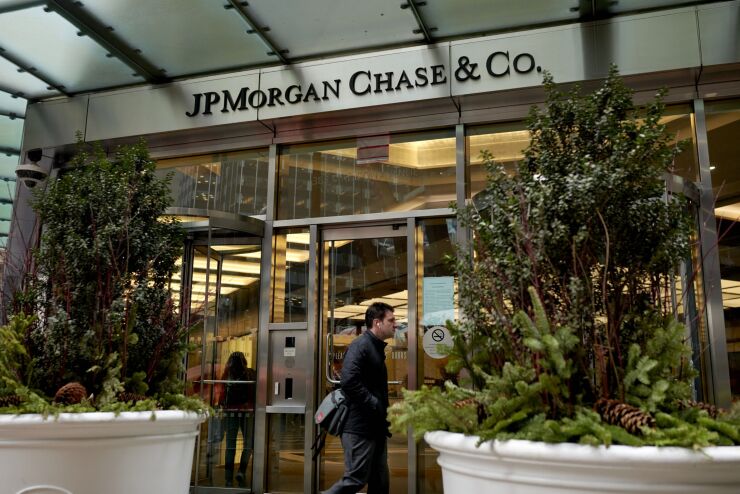
JPMorgan Chase says it could continue to deliver above-average returns even if the U.S. economy enters a recession.
America's biggest bank by assets on Friday posted better-than-expected first-quarter earnings and increased its net interest income forecast for the year.
Customer concerns about a recession, coupled with the Federal Reserve's steep rate increases, weighed on loan demand and utilization in the first three months of the year, Chief Financial Officer Jeremy Barnum said on a call with analysts. At the same time, internal forecasts of a weaker economy prompted the bank to set aside $1.1 billion of loan-loss reserves.
"We feel really good about how the company is positioned for a recession, but we're a bank — a very serious recession is of course going to be a headwind for returns," Barnum said. "But we think even in a fairly severe recession, we'll deliver very good returns."
The risk of a recession in the U.S. within the next 12 months stands around 35%, according to estimates from Goldman Sachs.
JPMorgan wasn't the only bank to consider the likelihood of a recession on Friday. Both Citigroup and PNC Financial Services Group said they expect a recession later in 2023, and Wells Fargo said it expects some slowing of the economy.
Citi CEO Jane Fraser pointed to a "notable softening" in consumer spending in the first quarter.
In the event of a recession, consumers would enter it
But the bank's data shows those extra savings will be gone by the end of 2023. That could squeeze consumer spending, which accounts for more than two-thirds of U.S. economic output.
"It remains to be seen whether this will cause a little bit of a cliff effect or whether consumer spending will simply slow down," Dimon's letter said. "Either way, this adds to whatever recessionary pressures there are sometime in the future."
Big banks with multiple business segments and diversified portfolios are in some of the best positions to handle a blow to consumer spending, said Michael McTamney, senior vice president of North American financial institutions at DBRS Morningstar.
"There's probably going to be some deterioration at a minimum, but banks like JPMorgan can easily absorb it," McTamney said.

JPMorgan raised its forecast for net interest income in 2023 to $81 billion from $74 billion, a good sign for investors concerned about the bank's ability to keep producing strong results during a potential recession.
Easing deposit-pricing pressures, higher revolving balances on credit cards and better-than-anticipated uptake of JPMorgan's newer deposit and certificate-of-deposit products drove the bank's upward revision to net interest income.
After an increase this year, the bank expects net interest income to fall to around $72 billion next year before improving to about $75.5 billion in 2025.
Overall, the bank reported earnings of $12.6 billion, a 52% increase from a year earlier. Revenue totaled $38.3 billion in the first quarter, up 25% from the same period last year. Average loan demand was flat.
JPMorgan said it collected about $50 billion of deposits after the failures of Silicon Valley Bank and Signature Bank in March, but it doesn't expect the inflow to stick around. The deposit influx reversed what would have been a quarterly decrease in deposits. Deposits across the industry have been on the decline thanks to higher interest rates and consumers' spending of the excess savings they built up during the pandemic.
JPMorgan resumed stock buybacks in the first quarter after halting them during the pandemic, when funds were put to use stimulating the economy. The bank repurchased about $1.9 billion of its shares in the first three months of the year and expects buybacks to total $12 billion by the end of 2023, Dimon said on the earnings call Friday.
"We're going to wait and see. We don't mind keeping our powder dry. You've seen us do that with investment portfolios, and we're also going to do that with capital," Dimon said when asked about the company's level of confidence in spending on buybacks amid economic uncertainty.




